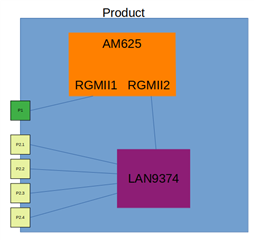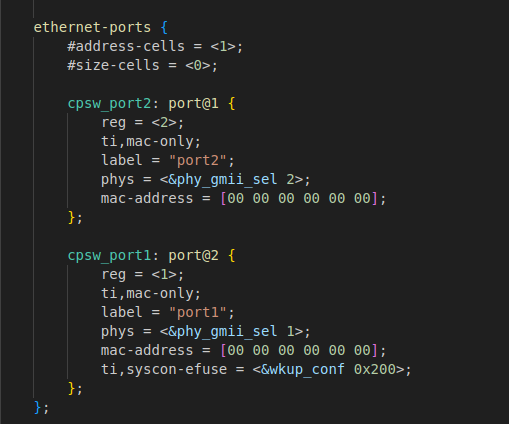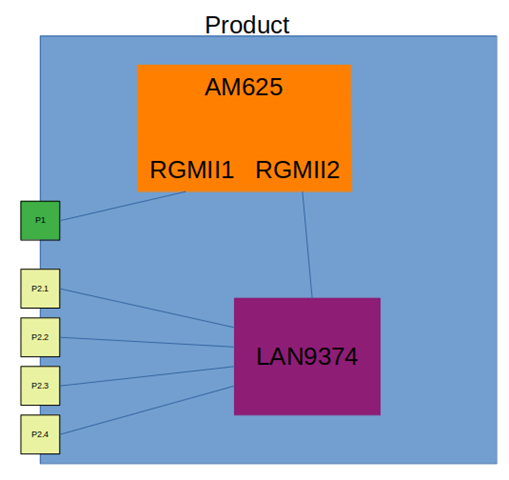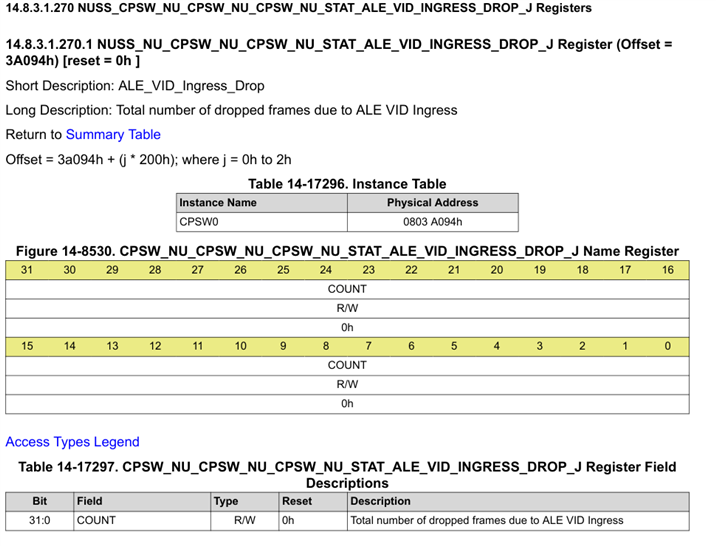Tool/software:
Hello,
I am trying to to connect an Ethernet switch to the RGMII2 interface on the AM625. The switch in question is a Microchip LAN8374.
The issue I'm having is with being able to connect the switch RGMII port to the AM625's RGMII2 interface- specifically, I cannot link the `ethernet` property of the port node to the cpsw_port2 node as it causes the switch initialisation to fail (ultimately because it cannot find the master node). I can successfully initialise the switch if I connect it to the cpsw3g node, but this seems to connect it to the RGMII1 interface rather than RGMII2.
My device tree configuration for the CPSW peripherals is as follows:
&cpsw3g {
bootph-all;
pinctrl-names = "default";
status = "okay";
pinctrl-0 = <ðernettx_pins_default>, <ðernett1internalswitch_pins_default>;
fixed-link {
speed = <1000>;
full-duplex;
};
};
/* TX Ethernet */
&cpsw_port1 {
bootph-all;
phy-mode = "rmii";
phy-handle = <&cpsw3g_phy0>;
//ti,dual-emac-pvid = <1>;
status = "okay";
};
/* T1 Ethernet Switch */
&cpsw_port2 {
//phy-mode = "rgmii-id";
phy-mode = "rgmii";
#address-cells = <1>;
#size-cells = <0>;
//ti,dual-emac-pvid = <2>;
status = "okay";
fixed-link {
speed = <1000>;
full-duplex;
};
};
/* Ethernet MDIO */
&cpsw3g_mdio {
bootph-all;
status = "okay";
pinctrl-names = "default";
pinctrl-0 = <ðernetmdio_pins_default>;
cpsw3g_phy0: ethernet-phy@7 {
bootph-all;
reg = <7>;
rx-internal-delay-ps = <1>;
tx-internal-delay-ps = <1>;
};
};
And my switch configuration is:
lan9374: switch@0 {
compatible = "microchip,lan9374";
reg = <0>;
spi-max-frequency = <44000000>;
power-supply = <&p1v1>;
phy-mode = "rgmii-id";
status = "okay";
mdio {
#address-cells = <1>;
#size-cells = <0>;
t1phy2a: ethernet-phy@0{
reg = <0x0>;
};
t1phy2b: ethernet-phy@1{
reg = <0x1>;
};
t1phy2d: ethernet-phy@2{
reg = <0x2>;
};
t1phy2f: ethernet-phy@3{
reg = <0x3>;
};
t1phy2e: ethernet-phy@6{
reg = <0x6>;
};
t1phy2c: ethernet-phy@7{
reg = <0x7>;
};
};
ethernet-ports {
#address-cells = <1>;
#size-cells = <0>;
port@0 {
reg = <0>;
label = "t1port2a";
phy-mode = "internal";
phy-handle = <&t1phy2a>;
};
port@1 {
reg = <1>;
label = "t1port2b";
phy-mode = "internal";
phy-handle = <&t1phy2b>;
};
port@2 {
reg = <2>;
label = "t1port2d";
phy-mode = "internal";
phy-handle = <&t1phy2d>;
};
port@3 {
reg = <3>;
label = "t1port2f";
phy-mode = "internal";
phy-handle = <&t1phy2f>;
};
port@4 {
reg = <4>;
label = "othermicro";
phy-mode = "rmii";
tx-internal-delay-ps = <2000>;
rx-internal-delay-ps = <2000>;
fixed-link {
speed = <100>;
full-duplex;
};
};
/* Link to AM625 */
port@5 {
reg = <5>;
label = "cpu";
phy-mode = "rgmii-id";
tx-internal-delay-ps = <2000>;
rx-internal-delay-ps = <2000>;
//ethernet = <&cpsw_port2>;
ethernet = <&cpsw3g>;
fixed-link {
speed = <1000>;
full-duplex;
};
};
port@6 {
reg = <6>;
label = "t1port2e";
phy-mode = "internal";
phy-handle = <&t1phy2e>;
};
port@7 {
reg = <7>;
label = "t1port2c";
phy-mode = "internal";
phy-handle = <&t1phy2c>;
};
};
};
Can you advise how DSA switches are supposed to be connected to RGMII2 please?
Thanks,
Ben






